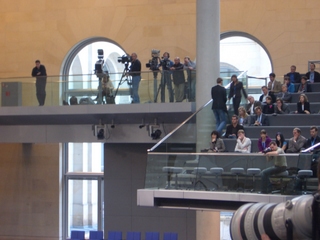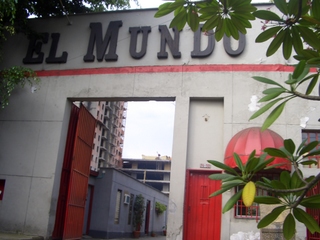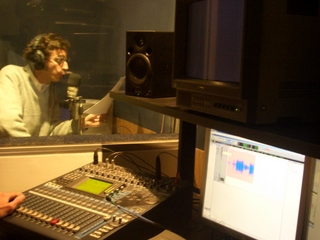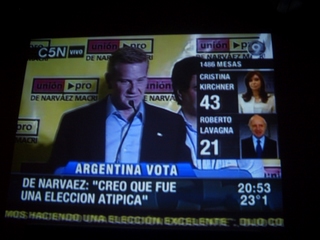Journalism between hope and trembling: the example of the Philippines
Raymund Villanueva still remembers July 2 2006 with horror. In the early morning that Sunday, the little broadcasting center of the community radio station „Radyo Cagayano“, which he helped building up, was being burned down completely. At about two in the morning, eight mummed soldiers infiltrated the premises in the small town of Baggao in the Northern Philippines, captivated and gagged the employees and ignited the entire radio station with petrol. Radyo Cagayano had just started broadcasting a few weeks ago and had especially stood up for the interests of local farmers. Until today, Radyo Cagayano has been unable to pick up his work again due to a murder on one of his employees and heavy reprisal. Raymund Villanueva supports the broadcasting station with technical equipment and know-how, after his own radio station has been prohibited by the government on the day of the emergency act of February 24 2006.
On the Philippines, it is especially obvious how big of an influence political and economic restrictions and dependencies towards journalists have on independent coverage. Notwithstanding, an independent and versatile media system is a precondition for reaching the UN-millennium-development-goals. A connection between the development of a country and the freedom of press has been proved statistically. Therefore, independent media is an indispensable element of a democracy, since it is capable of creating a national identity and promoting a vivid civil society.

The village Batad lies in 3000 years old terraces of rice – without electricity. Photo: B. Leers
For years, the presidential democracy of the Philippines has not been able to get rid of its sad role as one of the most dangerous countries for journalists. Already in the years of martial war under the dictator Ferdinand Marcos, 30 journalists have been killed on the archipelago. Even after the fall of the regime, a certain culture of violent assaults and cases of corruption remained undiminished and has been constraining the development of an actual free press remarkably until today. Even 23 years after the revolution, the violence towards journalists remains on a terrifying high level: according to the Center for Media Freedom and Responsibility, 77 press representatives have been killed in the context of their work since 1986, 42 alone under the government of the current president Gloria Macapagal-Arroyo since 2001.
Radio journalists are extraordinarily exposed to the reprisals and violence because they are often reporting about nepotism and illegal intrigues of members of the local government, policemen or administration officials. The case of Dennis Cuesta is a common example: in August 2008, the 38-year-old radio journalists has been executed by an assassin on a motorcycle in the streets of General Santos City, with his colleague Bob Flores watching. Cuesta had been criticising how little measures the city had taken for preventing floods and had been reporting on illegal gambling, in which the local police was supposed to be involved. This might have turned out fatal for him in the end. So far there have been no concrete results of investigation – probably because such findings might be connected to the mayor or the police. Also Flores as a witness has been under serious threatening ever since and has escaped to a witness protection program in Mailand.

Quiapo in Manila is a shopping centre for the manila class. Photo: B. Leers
The circumstances of the execution of Dennis Cuesta are according to the typical pattern on the Philippines: a journalist is being shot; the local police investigates only with hesitation or even manipulates the indications for certain suspects, for example in case of local politicians. The witnesses of the crime are being threatened, bribed or killed as well in order to prevent them from giving evidence in court, what also frightens other witnesses. The case stays unsolved in the end and enforces the culture of impunity for murder on journalists.
The consequence of this impunity for crimes is self-censorship among the journalists regarding explosive topics; the entry into the vicious circle of corruption, in which the media representatives are writing on behalf of those who offer the most or omit the coverage at all; as well as carrying arms, which undoes all objective coverage and can easily lead to misuse. Journalistic independence and fair coverage are victimized due to threatening or financial interests. Actions for slander prevent the uncovering of corruption and other drawbacks. The extreme profit orientation and the strong competitiveness within the media system of the Philippines weaken the quality of coverage, since good, brave journalists are exchanged for cheap, bad ones. All these phenomenons cause a journalistic culture, which does not respect a democracy by far. For the population it is difficult to build an informed political opinion and to react to drawbacks within the society in an appropriate way. A functioning civil society is being impeded this way.
Many journalists on the Philippines and in other countries with similar conditions have to be accredited for the adverse circumstances under which they are working. One has to have a lot of idealism in order to perform an exhausting and often dangerous work in an ill famed and little appreciated profession for little payment. However, luckily, there are many journalists like Raymond Villanueva, which regard journalism as a sort of academic occupation. Such journalists can be dared to communicate and explain to the people topics such as human rights and the UN-millennium-goals, and to show creative ways in which the population can contribute to its concrete implementation. Experience has shown that the millennium goals are abstract and therefore not attractive for the recipients. Nevertheless, if the journalists manage to break down the overall goals to the level of the common people and their local concerns, an appropriate coverage and the creation of awareness for the millennium goals will become possible. Therefore, journalists must be given the chance of informing autonomously and independently. Often this becomes possibly via, for example, community radio stations, which represent an antipole to commercial radio stations on the Philippines, and which, according to Prativa Chhetri from the World Association of Community Radio Broadcasters, contribute to the development of the country through the development of a functioning society.

Since World War II the Jeepneys belong to the pop culture. Photo: B. Leers
The situation on the Philippines swings between hoping and trembling. Unfortunately, pleas such as the one of the UNESCO- secretary general Koichiro Matsuura during a conference in September 2009 have contributed little to the clarification of murder and to the protection of the right of freedom on the Philippines. Nevertheless it is important to not lose sight of these issues on an international scale but to promote a change in mindset among the governments in order for the journalistic coverage to be regarded more and more as a valuable good. Measures under the banner of counter-terrorism or the maintenance of public order may not be an excuse for public restrictions on precise coverage – that is to say nowhere in the world.
It is certainly no coincidence that, in their current report on the situation of the millennium goals, the United Nations demand that the modern possibilities of communication should be made available to the people in developing countries in a better way. In the end of 2007, there were two billion extensions of mobile phone, which are equivalent to about 39 percent of the population in these countries. This high number represents an extraordinary potential for spreading news or warnings of natural disasters quickly. Also the internet has become a tool in developing countries for working on the millennium goals and for strengthening the necessary freedom of the press. The organisation of the demonstrations in June 2009, which inflamed to protests against the presidential elections in Iran, should serve as a reminder. Traditional media was chanceless against the regime, but the many brave twitter- and facebook-users could not be confined. However, the numerous false reports, which were transferred via the new channels, have shown that the tasks of journalists cannot be substituted at all nowadays.

The Philippines are famous for wonderful beaches and bays. Photo: B. Leers
Raymund Villanueva knows about the potential of the new media and uses them especially heavily after the restrictions against the classic media. Through his non-profit enterprise Kodao, he pursuits a multimedia approach, produces documentaries and radio features, organizes trainings on the job for journalists and offers technical support in order to promote a network of audiovisual media for the people. The typhoon Ondoy at the last weekend in September and its devastating impacts on the capital Manila have shown how significant a diverse network of independent journalists and media as well as individual bloggers and users of twitter and mobile phones have become for emergency aid and the building of a functioning civil society in developing countries. Thus, they have become key factors in reaching the UN-millennium goals. Furthermore, Raymund Villanueva is convinced that the democratic development and the freedom of all kinds of journalism on the Phlppines are going in parallel ways and that they call for each other. Which direction these parallel ways will take is uncertain however.
Benjamin Leers
Benjamin Leers, Author and Producer for documentary films in Cologne, Germany. He spent ten months in the Philippines and is involved with partnership projectc in Tansania. He wrote the book: Zwischen Selbstzensur, Korruption und Bewaffnung. Konsequenzen der Gewalt an Medienvertretern am Beispiel lokaler Radiojournalisten in der philippinischen Provinz. LIT-Verlag, 2009 (Between hope, corruption and arms. Concequences of violence for media on the example of local radio journalists in the Philippine Province.
Next Blog by:
Ewald Scharfenberg, Caracas/Venezuela, journalist and consultant, has been correspondent in Caracas for Reporters Without Boarders for ten years. Today he is CEO for the Institute of Press and Society (IPYS) in Venezuela.










